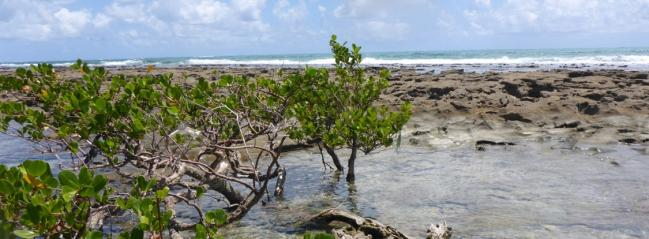Research aims
One of the many hidden but essential services of coastal and intertidal ecosystems is maintaining the balance between production and release versus retention and storage of nutrients and organic matter, ensuring healthy and productive coastal waters. The gaps in our knowledge of key processes and players in this dynamic system prevent us from understanding what drives organic matter dynamics in coastal waters – not to mention our ability to predict these processes or to design an ecosystem that reliably releases or retains organic matter and nutrients. It is, for instance, an ongoing discussion whether and to which degree the effect of the coastal vegetation on coastal waters is retention and storage or release of organic matter and nutrients.
The mediation of fluxes of nutrients and organic matter within the marine-terrestrial ecotone is mostly driven by the coastal (sub-, inter- and supratidal) vegetation, i.e., mangroves, saltmarshes and seagrass: food webs in adjacent coastal ecosystems are linked by trophic coupling through detritus food chains, including the passive transport of particulate detrital matter and its retention entangled in the vegetation. Consumers in estuarine and coastal water bodies have been assigned to feeding on different food sources within the coastal ecotone or to rather unselectively mixing resources: whereas some coastal or estuarine species strongly depend upon the input of mangrove leaves as food source, others consume hardly any of these potential food sources but rather rely on marine resources.
ExManCoast combines field studies and laboratory experiments to investigate how the coastal vegetation and the associated benthic fauna of two contrasting mangrove areas in Northern Brazil – one with high sediment load and essentially no subtidal vegetation, one with adjacent seagrass beds and reefs – drive the dynamics of nutrients and organic matter within the coastal ecotone.
Project Partners (Germany) |
International Project Partners | |
|---|---|---|
|
Prof. Dr. Thorsten Dittmar (ICBM, Oldenburg) Dr. Tim Jennerjahn (WG Ecological Biogeochemistry) Dr. Véronique Helfer (WG Mangrove Ecology) Mirco Wölfelschneider (Doctoral Candidate, WG Mangrove Ecology) plus MSc and BSc students (WG Mangrove Ecology) |
Prof. Ulf Mehlig Universidade Federal do Pará (UFPA), Campus Braganca, Brazil Prof. Vanessa Hatje, Universidade Federal da Bahia (UFBA), Salvador |





